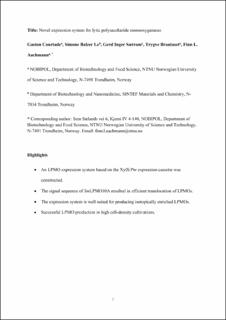| dc.contributor.author | Courtade, Gaston | |
| dc.contributor.author | Le, Simone Balzer | |
| dc.contributor.author | Sætrom, Gerd Inger | |
| dc.contributor.author | Brautaset, Trygve | |
| dc.contributor.author | Aachmann, Finn Lillelund | |
| dc.date.accessioned | 2017-12-21T14:43:01Z | |
| dc.date.available | 2017-12-21T14:43:01Z | |
| dc.date.created | 2017-02-21T09:45:47Z | |
| dc.date.issued | 2017 | |
| dc.identifier.issn | 0008-6215 | |
| dc.identifier.uri | http://hdl.handle.net/11250/2473600 | |
| dc.description.abstract | Lytic polysaccharide monooxygenases (LPMOs) are key enzymatic players of lignocellulosic biomass degradation processes. As such, they have been introduced in cellulolytic cocktails for more efficient and less expensive lignocellulose saccharification. The recombinant production of LPMOs in bacteria for scientific investigations using vectors typically based on the T7 and lacUV5 promoters has been hampered by low yields. Reasons for this have been catabolite repression when producing the proteins in defined media with glucose as the sole carbon source, as well as the lack of an inducible expression system that allows controlled production of LPMOs that are correctly processed during translocation to the periplasmic space. A cassette vector design containing the XylS/Pm system was constructed and evaluated, showing that the expression cassette could easily be used for exchanging LPMO coding genes with or without signal sequences. The cassette was shown to reliably produce mature (translocated) LPMOs under controlled conditions that were achieved by using a low dosage (0.1 mM) of the Pm inducer m-toluic acid and a low (16 °C) cultivation temperature after induction. Furthermore, the signal sequences of five bacterial LPMOs were tested, and the signal sequence of LPMO10A from Serratia marcescens was found to give highest levels of recombinant protein production and translocation. The LPMO expression cassette was also evaluated in cultivations using defined media with glucose as the sole carbon source with a product yield of 7–22 mg per L of culture in shaking flasks. The integrity of the recombinant proteins were analyzed using NMR spectroscopy, showing that the system produced correctly processed and folded LPMOs. Finally, high cell-density cultivations of the recombinant strains were carried out, demonstrating stable protein production levels at similar relative yields (42–1298 mg per L of culture; 3.8–11.6 mg per OD600nm unit) as in shaking flasks, and showing the scale-up potential of the system. | nb_NO |
| dc.language.iso | eng | nb_NO |
| dc.publisher | Elsevier | nb_NO |
| dc.rights.uri | http://creativecommons.org/licenses/by-nc-nd/4.0/deed.no | |
| dc.title | A novel expression system for lytic polysaccharide monooxygenases | nb_NO |
| dc.type | Journal article | nb_NO |
| dc.type | Peer reviewed | nb_NO |
| dc.description.version | acceptedVersion | nb_NO |
| dc.source.journal | Carbohydrate Research | nb_NO |
| dc.identifier.doi | 10.1016/j.carres.2017.02.003 | |
| dc.identifier.cristin | 1452627 | |
| dc.relation.project | Norges forskningsråd: 226244 | nb_NO |
| dc.relation.project | Norges forskningsråd: 221576 | nb_NO |
| dc.description.localcode | © 2017. This is the authors’ accepted and refereed manuscript to the article. This manuscript version is made available under the CC-BY-NC-ND 4.0 license http://creativecommons.org/licenses/by-nc-nd/4.0/ | nb_NO |
| cristin.unitcode | 194,66,15,0 | |
| cristin.unitname | Institutt for bioteknologi | |
| cristin.ispublished | true | |
| cristin.fulltext | original | |
| cristin.qualitycode | 1 | |

